
Has anybody in history truly cracked third-party controllers? Maybe we’re all just brainwashed by brand power, but the moment a gamepad turns up that isn’t made by a console platform holder, the received wisdom is to roll one’s eyes and prepare for the worst.
The likes of Thrustmaster, PDP and Scuf are doing their best to dislodge that ancient truism, though, and the former’s $169 eSwapX 2 Pro controller might look like it’s named after a wifi password but it’s actually a very strong Xbox and PC gamepad for competitive gamers and aspirational casuals alike.
There’s a level of customization you don’t get with Sony and Microsoft’s pads — pull out the analog stick and d-pad modules, then drop them into whatever arrangement suits you for each game you play.
You’ll also find additional adornments too, like mechanical face buttons that Thustmaster claims to be 64% quicker than the traditional switches. However it’s priced to go toe-to-toe with Xbox’s own Elite Controller 2, the most complete and well-built model on the market.
This is going to be a tough fight, so read on and I’ll tell you how close the third-party manufacturer comes to toppling a giant.
Thrustmaster eSwap X 2 Pro: Specs
Thrustmaster eSwap X 2 Pro: Design and comfort
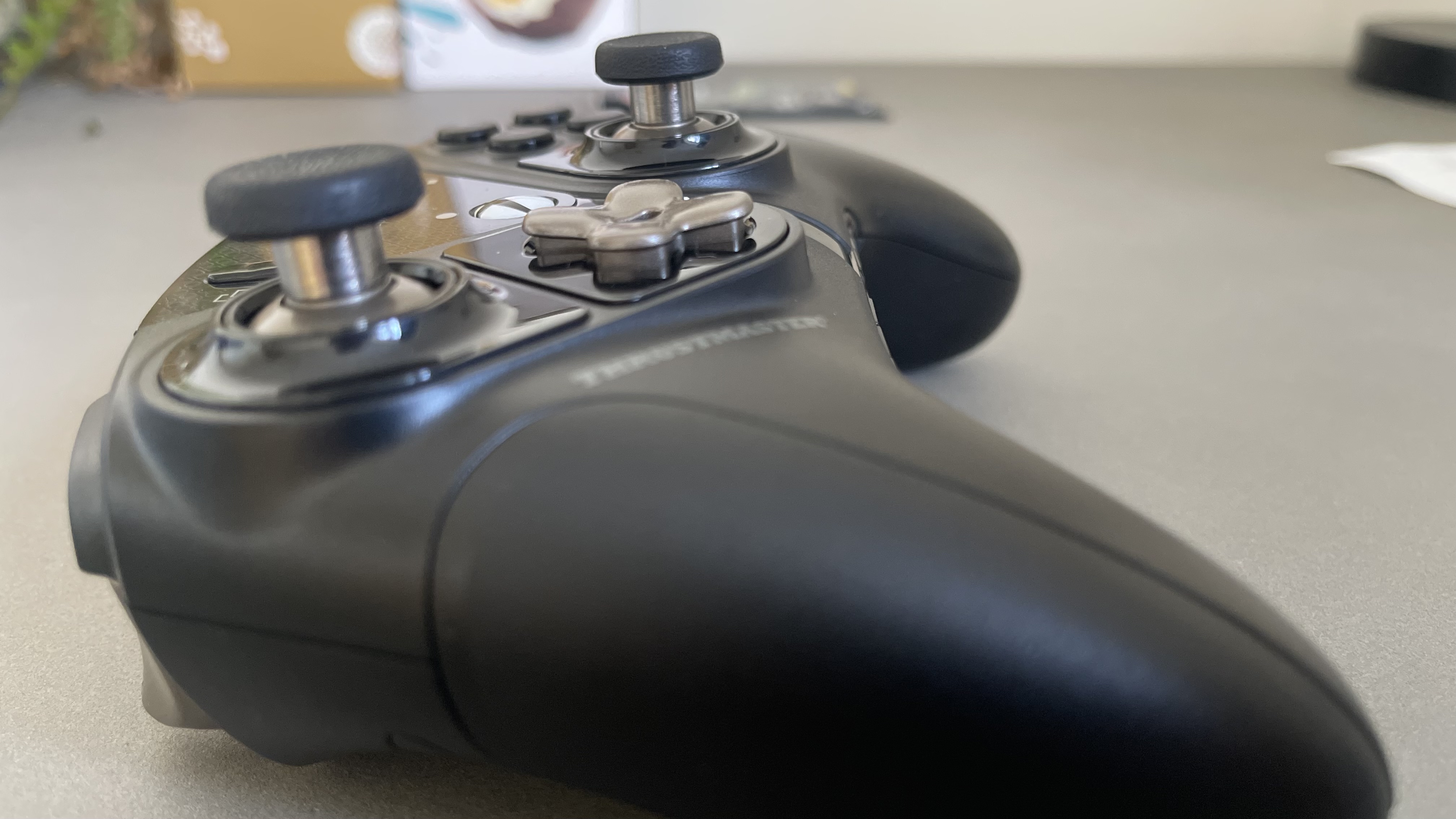
Unlike Scuf’s Xbox pad, Thrustmaster’s ergonomic design doesn’t simply mimic the OEM shape. This pad’s both wider and longer than an Xbox pad, but it doesn’t suffer in terms of comfort for going XL.
In reality the extra size is probably there to cater for the swappable modules and the click-in circuitry that powers them, but the ergonomic design incorporates those modules well without feeling downright unwieldy.
However, the finish and construction materials are simply too basic for this price point. There’s no rubberized finish anywhere, and only the very top of the triggers are textured — everywhere else, it’s smooth plastic that gets slippery when your palms get sweaty. So, pretty much instantly, then.
Compare that to the Xbox Elite 2’s abundance of textured rubber on the underside and the eSwap X 2 doesn’t stack up favorably for the same money. If you’re going to charge a premium, it needs to feel premium.
The pad holds up well ergonomically regardless of where you place the analog stick and d-pad - either in a Sony or Xbox format, or even with the d-pad on the right-hand side if you’re an absolute maniac.
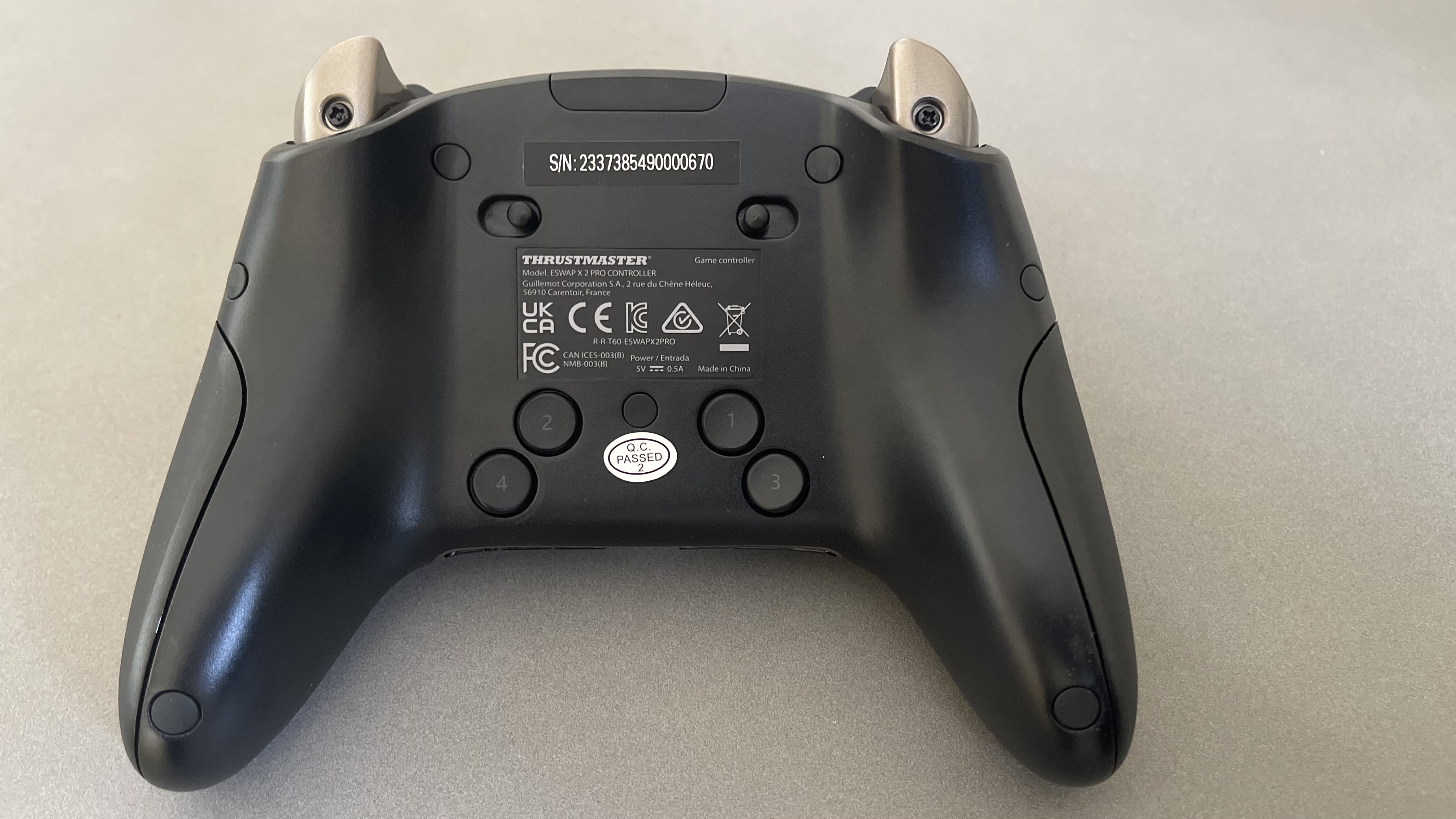
However, the bank of four buttons at the rear are difficult to locate, and their placement affects how you grip the pad. You can feel that every effort has been made to alleviate this with the contouring of the buttons themselves, but they feel too low down to be useful.
Again, Microsoft solved this problem with gen 1 of the Elite controller by adding gearshift-style paddles to the back of the pad. That makes it really useful for racing games, and I wish Thrustmaster had followed suit because I can’t use these four buttons for anything important.
Let’s end the section on a positive note, though. Although the sticks and face buttons are designed with performance in mind, their high quality construction and mechanical switches really add to the comfort. Tapping the face button and getting that satisfyingly clicky feedback makes this pad a unique joy to use.
Thrustmaster eSwapX 2 Pro: Gaming performance
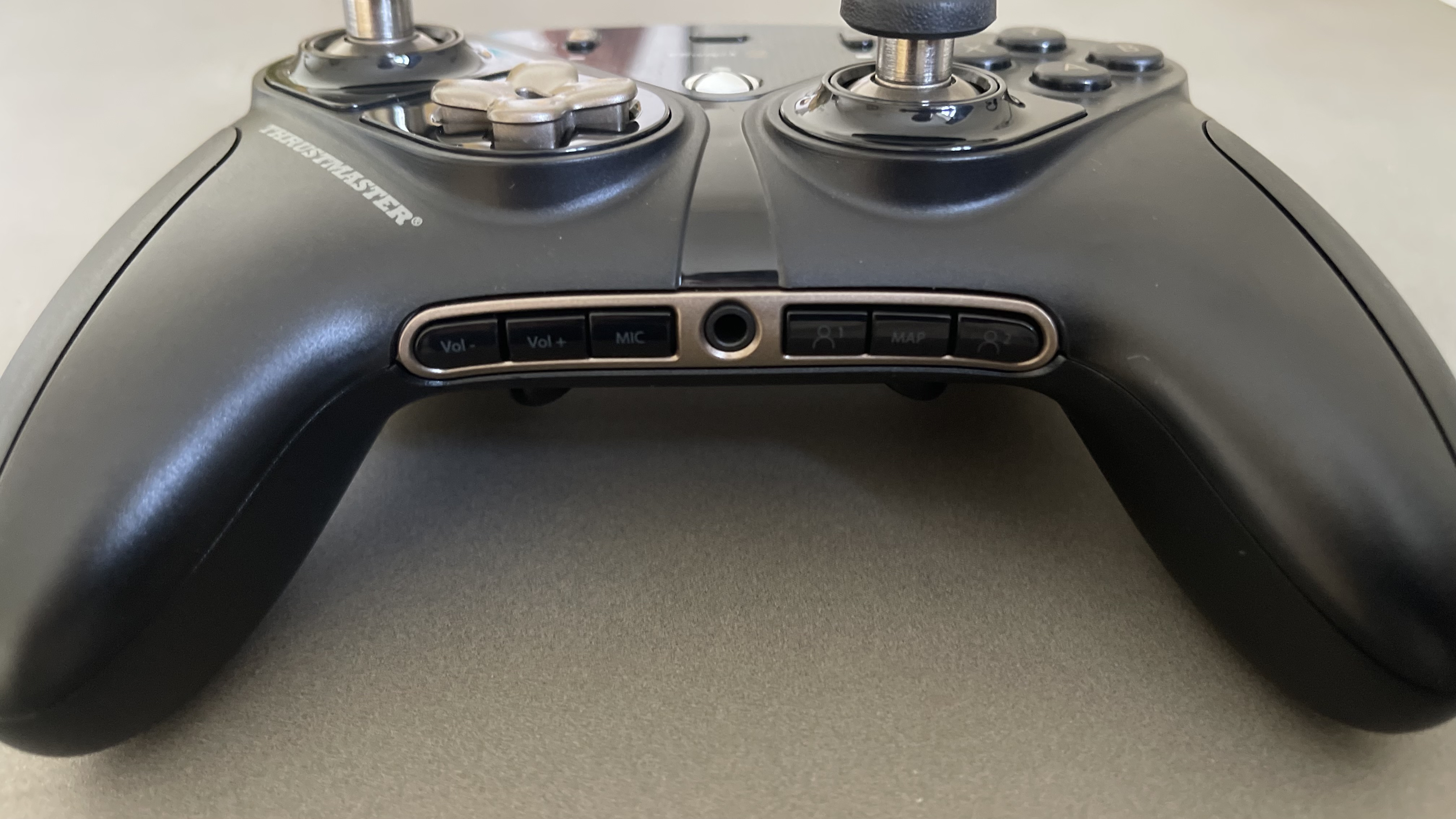
This pad’s serious about its performance chops. The analog sticks are S5 NXGs favored by pro players, and the d-pad’s been developed in conjunction with pros from the fighting game community. Thrustmaster wants the eSwapX 2 Pro in your hands, whether you’re playing solo in your bedroom or practicing for the prize pool.
And in this regard, it delivers. Your humble writer here is no esports-caliber gamer, but the snappy springback to center position on these analog sticks makes precision gestures feel easy and precise. There’s just the right amount of travel on the thumbsticks, and a perfect level of resistance. The Xbox Elite 2 and its wobbly magnetic sticks must concede a loss in this category.
It’s another big win for the d-pad. At first the mechanical switches below the d-pad unit feel a bit cheap, but when you actually start entering inputs its virtues make themselves clear. Rolling the d-pad to achieve diagonal inputs (think Ryu’s Hadouken), I noticed that I felt more precision and feedback. You can feel the collaboration with pro FGC players paying off.
Those face buttons have mechanical switches below them too, and while this took a bit of time to get used to, I prefer the sensation now. I’m not sure it’s making me a better gamer in any tangible sense despite the faster input registration speed, but it sure feels satisfying to button-mash.
However, as we move up the pad and into the shoulder buttons and triggers, we hit some snags. These shoulder buttons just don’t feel like they belong on this pad. In a product that’s focused on high performance and money-no-object speccing, RB and LB feel simply too wobbly, and the switch covers are lightweight plastic that just doesn’t convey quality. Don’t get me wrong — it’s not going to impact your performance one bit. It just doesn’t make you feel great about dropping more than $150 on a gamepad.
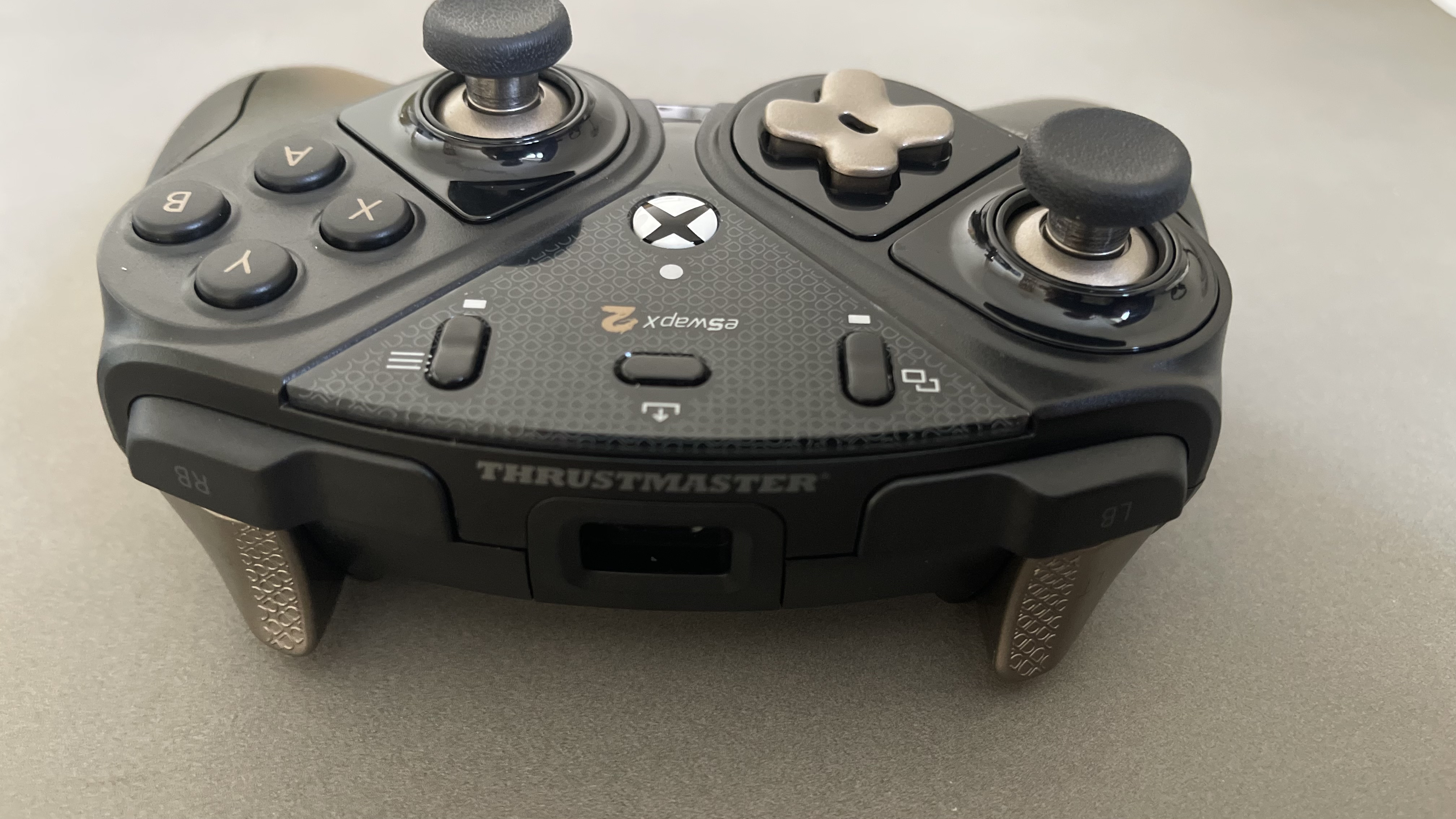
I’m going to use the Elite 2 as a counterpoint again, though. There’s slightly less resistance in Thrustmaster’s triggers, less overall travel, and less of a dampened feel when you bottom them out. Once again this has very little bearing over gaming performance - it’s perhaps fractionally harder to be precise with inputs between 0-50% - but leads to the eSwapX 2 simply feeling a bit short of its price point.
Thrustmaster eSwapX 2 Pro: Customisation
This is a very customizable pad. Aside from the ability to change the layout using the modular sticks, Thrustmaster’s ThrustmapperX software lets you dial in sensitivity levels for the sticks and triggers, remap all the buttons, and save profiles for quick recall.
In addition, you can swap out the concave, traditional Xbox-style thumbsticks for convex topped sticks as you’d find in the days of yore. Personally, these feel too slippery and uncomfortable, but maybe you love them. It’s nice to have the option.
Much is made of these swappable modules in this pad’s marketing, and likewise PDP’s Victrix controller, but let’s be real about the benefits: they’re there, but they’re small.
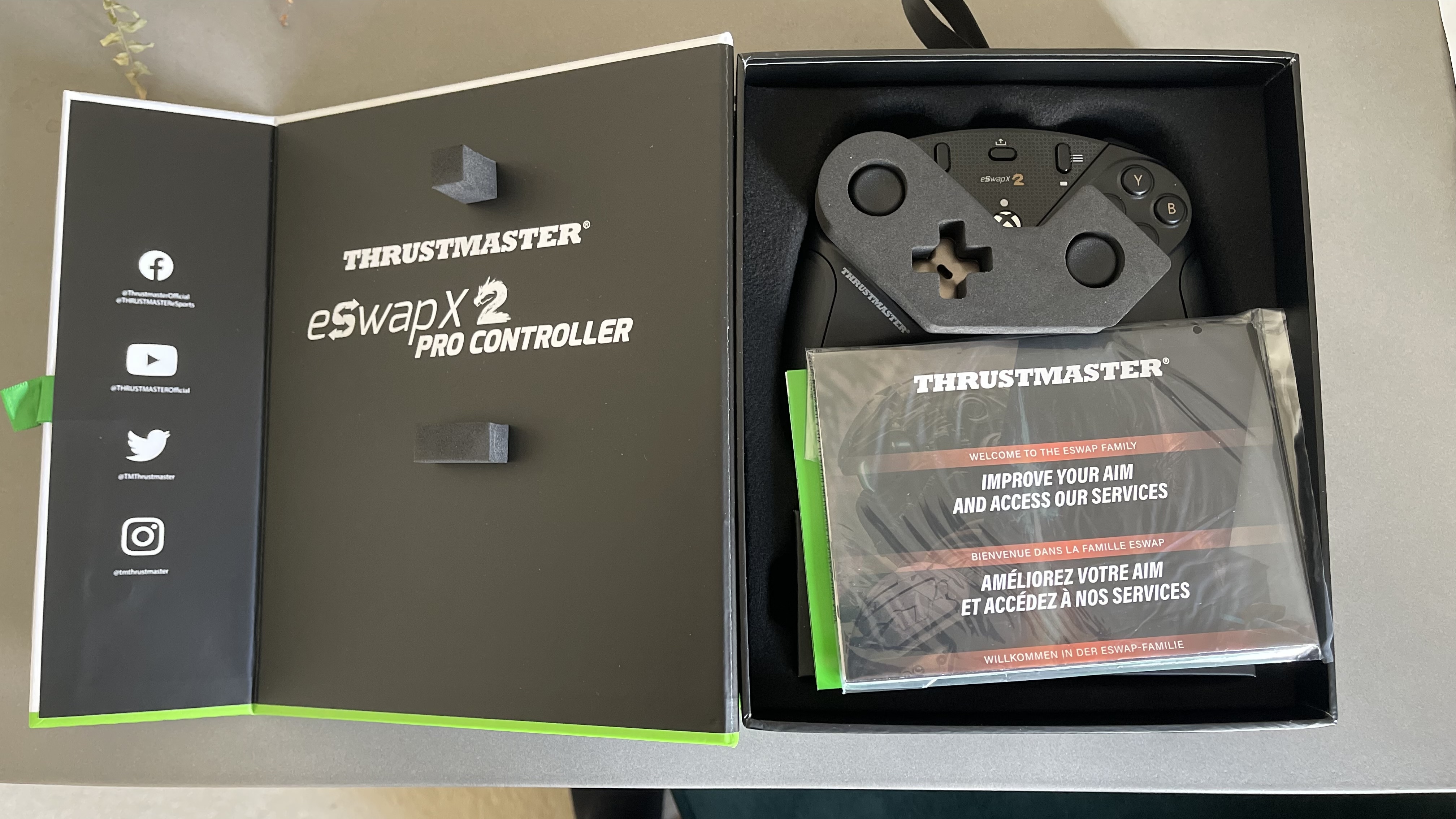
On one hand, it’s useful to be able to quickly change the orientation between games. Some people’s muscle memory for shooters is seared permanently using a Halo-style original Xbox layout with the left analog stick above the d-pad. However for racing games, it often feels more natural to have the two sticks aligned horizontally. So yes, it’s definitely nice to swap them on the fly.
However, I found that I settled into using the same layout for all games pretty quickly. Unless you’re a very high performance player in several games, you’ll probably end up doing the same.
Thrustmaster eSwapX 2 Pro: Verdict
This is a difficult controller to score. I’m going to keep using it, even though in many areas it doesn’t stack up favorably against the Elite 2 pad that’s previously been my daily driver. But I’m not going to use it for racing games, because those extra buttons at the rear of the pad don’t feel usable to me as gear shift inputs.
It’s the great analog sticks and super-clicky mechanical face button switches that have convinced me to keep going despite the ergo mis-step at the rear, and despite the flimsy shoulder buttons. So in my really specific use case, it’s a narrowly achieved success. It stays on my desk.
However, the price is just too high to recommend this wholeheartedly, knowing how strong the PDP, Scuf and OEM Xbox Elite pads are. As is so often the case, the eSwapX 2 feels one revision away from delivering a take-my-money proposition. That revision needs to rethink the shoulder buttons and make the triggers feel even more premium, and it needs to reposition the four buttons to the rear. Then we’ll have a real contender, quite literally, on our hands.







